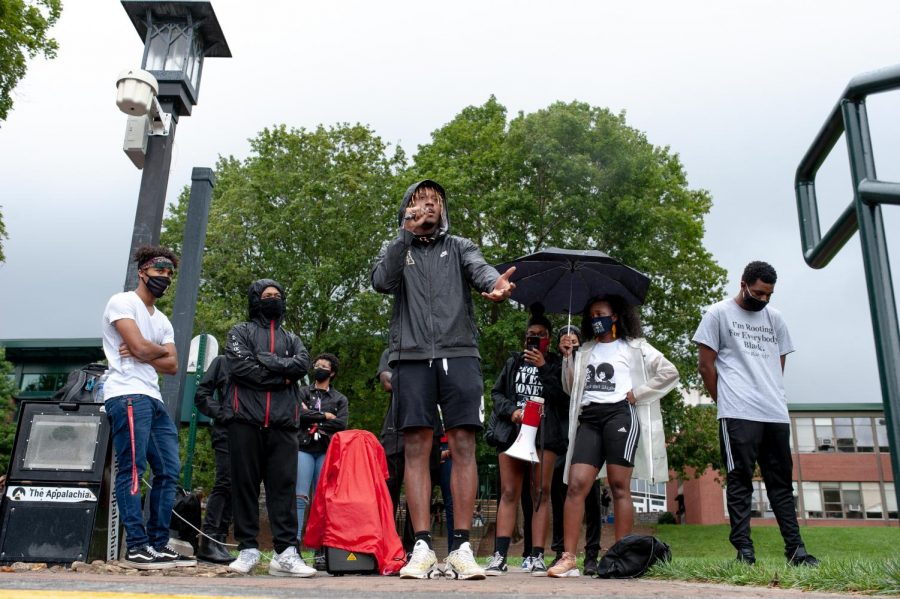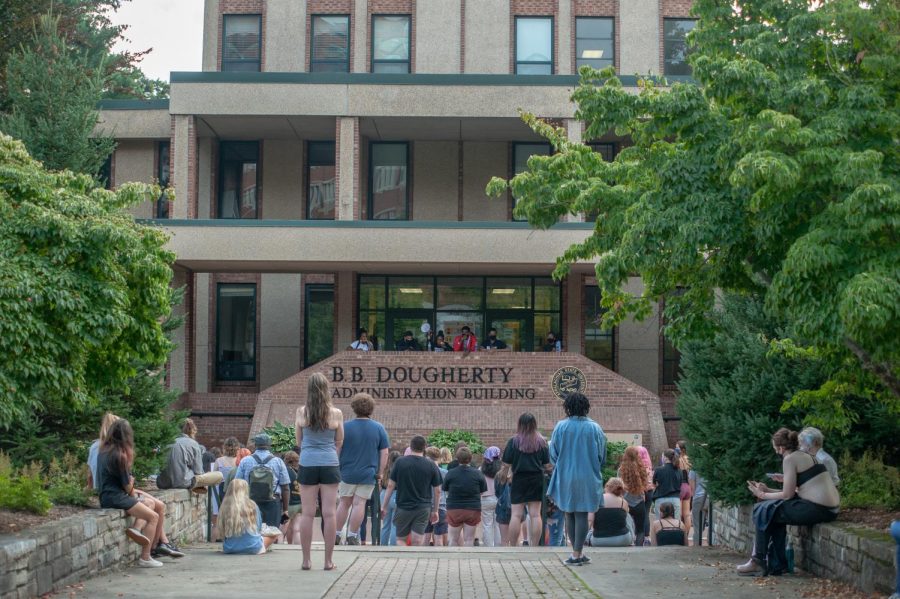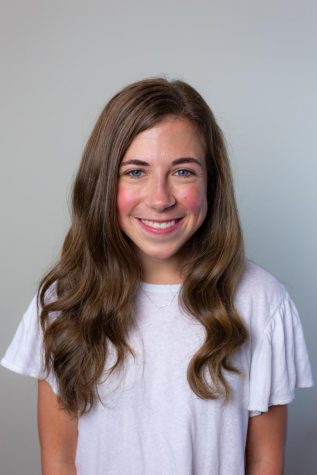“Sheri, wake up”
Black at App State Collective leads march against injustice
Camerun Peoples speaking during the Wake the Chancellor event on Sanford Mall Aug. 31, 2020.
September 4, 2020
Nearly 250 students from all walks of campus life, faculty and police gathered Monday to share stories and march alongside the Black at App State Collective from Sanford Mall to Chancellor Sheri Everts’ office. The group garnered attention for demands they sent to the university this summer, and organized the march against injustice to “wake the chancellor.” The collective says the university has not met the group’s demands, which focus on programming like diversified recruiting and a bias reporting system.
“We are tired. So that is why we have gathered here today as a collective, to ask for change,” said Korbin Cummings, a leader in the coalition. “We are asking for demands to be fully implemented that we have created, and we are asking for these demands to be implemented today. Please participate fully.”
Jay Edwards, another leader in Black at App State, asked all non-Black attendees of the march to kneel in reflection.
“Black folks, look around you,” he said. “See your support system, see your kin, see the folks that love you. White folks, reflect. Reflect on what you’re doing right now. Reflect on what you’re not doing.”
Jay Edwards asking all non-Black attendees to kneel if able — group taking a moment of silence pic.twitter.com/P6B2IvWgYG
— Jackie Park (@jackiempark) August 31, 2020
Students lined up at a microphone on the mall to share their stories about being Black at App State.
“I’ve been an RA for four years. I’ve had to deal with white kids saying (n-word) for four years,” said Charles Fennell, a senior. “(I have to) hop out of my bed at 3 a.m. to go talk to somebody for four years saying, ‘You can’t say that. I’m the only one on the hall who can say that because I’m the only one on the hall that’s Black.’”
Fennell has lived on campus for nine semesters now, and said after all his years working to make campus a safe space for Black students, and being silenced in the process, he is proud to leave the work to the collective when he graduates in December.
“I’m grateful to see this,” Fennell told the crowd. “I’ve never seen this on App State’s campus. I’ve never seen this.”
Olivia Shepherd, a member of the Black Student Association executive board, said she’s wanted to go to App State since she was 4 years old. But, when Everts didn’t say Black Lives Matter in her statement on racial injustice, Shepherd said she wanted to transfer.
“It crushed my heart. It ruined my day,” she said.
Shepherd said it’s disappointing that the chancellor is so enthusiastic about the football team, of which many of its players are Black, but can’t say, “Black Lives Matter.”
“We should feel safe,” Shepherd said. “It is (Everts’) job to make us feel safe, regardless of race. So we need the change, and we need to see it now. We are the change.”
Kynda Bichara is the president of the Black Student Association and a leader of the collective. She says she’s tired.
“I’m president of two (organizations), that’s not by choice,” she said. “Some things you have to step up and do because others are not doing them.”
Bichara told the crowd they need to show up all of the time – not just on social media or when there are protests – but in their classrooms and with their families.
“This isn’t a trend,” she said. “This isn’t something you post on Instagram cause you look cute with your sign. Our oppression isn’t your hashtag.”
In the wake of the police killings of Breonna Taylor and George Floyd, and the recent shooting of Jacob Blake, Bichara said she is expressing anger, but it isn’t coming from hate.
“When we say Black Lives Matter, we say that because we’re being killed, we’re being executed,” Bichara said. “I am Breonna Taylor, my brother is George Floyd …. But they ask why I’m an angry Black woman. Maybe it’s because you’re killing my brothers, my fathers and my son.”
Data compiled by The Washington Post show that the rate at which Black people are killed by police is more than twice the rate for white Americans.
Black at App State members shared frustrations at the lack of communication they had received from the chancellor and university administrators.
At the march, the collective shared that in a meeting with the Chancellor’s Cabinet this summer, their group was muted and not allowed to use the chat function in Zoom. They also said the university switched to using their own Zoom link at the last minute, instead of using the link the collective shared ahead of time.
“I know they see us,” Cummings said. “They send us emails in private, telling us to have coffee. (Emails that say) ‘We support y’all.’ What are they doing?”
Everts did not show at the march; however, other administrators, like Jeff Cathey, director of Student Engagement and Leadership, and Willie Fleming, chief diversity officer, attended the march and continually communicated with the leaders of the collective.
In a statement to The Appalachian, Everts said she and her team are moving forward with work on the collective’s concerns and the university’s strategic diversity plan.
“Black Lives Matter. Students, faculty, staff, alumni and members of the university administration share a strong desire, sense of urgency and a steadfast commitment to move forward on the diversity and inclusion work that is underway at App State and to begin on important new work that needs to be done,” Everts said.
Later, the group made its way down and across lanes of traffic stopped by App State Police toward B.B. Dougherty administration building, where Everts’ office is located. There, students occupied three floors of the building and chanted “Hey, hey, ho, ho, Sheri Everts has got to go.”
NEW: @BlackAtAppState’s “Wake the Chancellor” march has moved inside the administration building where @AppChancellor’s office is located. pic.twitter.com/jYgVKo89sr
— Emily Broyles (@em_broyles) August 31, 2020
When participants entered B.B. Dougherty, App State Police informed them that when the building closed at 5 p.m., they needed to leave, said Andy Stephenson, chief of App State Police.
When that time came, Capt. Johnny Brown, patrol commander for App State Police, formally asked all attendees to leave the building. But, several participants and members of the collective stayed inside.
Outside, supporters stayed at the doors to B.B. Dougherty and watched a live stream Bichara posted to the Black at App State Instagram while inside with police and administrators. Cummings amplified the live stream through a megaphone for supporters
Korbin Cummings is streaming @BlackAtAppState’s live through a megaphone so students outside can hear. pic.twitter.com/G0INx0Wa5l
— Emily Broyles (@em_broyles) August 31, 2020
“There’s some values we have to stand for,” Bichara said on the live stream.
When several members of the collective left B.B. Dougherty, they were crying with tickets clutched in their hands. But, Stephenson says police did not issue citations.
Cameron Hunter, SGA VP, holds his ticket from @appstatepolice. He was in the building with other @BlackAtAppState leadership after 5:00 p.m. pic.twitter.com/y8Jfe3CJ4c
— Emily Broyles (@em_broyles) August 31, 2020
“After meaningful dialogue, negotiation, and open discussion about issuing citations, participants chose to leave the building with no citations issued. The interaction with participants was calm, transparent and cordial,” Stephenson said.
Bailey Gardin, a member of the Black at App State Collective said the citations were rescinded on behalf of an administrator or faculty member who was present.
Mary Lyons, an App State alumna, came to the march after she heard about police presence inside.
“This stuff is hard,” she said. “These fights are hard. The meetings that some of y’all have been in that have gone nowhere are hard. The fact that some of y’all have had to leave to go to work, the fact that y’all have to work after this, the fact you got homework, the fact that you have kids at home. All of life is hard. And racism and white supremacy, an absent chancellor, just make it harder.”
On Friday, members of Black at App State will meet with six members of university administration, according to a member of Black at App State. As of Thursday, Everts has not communicated with the collective.















Dear Andy Martin and Thomas Jones • Sep 7, 2020 at 4:27 pm
Andy Martin, Black at App State is a group, which makes it a proper noun. White is not a proper noun, since it is not a group. Why are you asking this question? Seems like you’re missing the point of this article. Or maybe you’re opposed to it?
Thomas Jones, who says we’re worried about peacefully coexisting right now? The police don’t seem to worry about that. Sheri Everts doesn’t seem to worry about that. Did you know that the southern states worried about not peacefully coexisting when they voted to not uphold the laws put in place following Brown vs Board of Education? Do you wish we still lived in the 1950s? Before MLK? When there were separate water fountains and the KKK was lynching people regularly? Peace is something that comes when there are no more problems. Until we solve today’s problems, talking about peace is like talking about when we’ll die–it’s gonna happen, but not until we finish living our life. So why bring it up?
Thomas Jones • Sep 5, 2020 at 7:11 pm
Whether we like commands coming from law enforcement or not if a Lawful order obey it. Excessive force shouldn’t be used on anyone but given the dangers in policing citizens full compliance is the only way to prevent needless loss. As a twice graduate of ASU tolerance for others beliefs is important but that’s all beliefs not just the ones you support. To do otherwise is to no longer peacefully coexist and ultimately war.
Andy Martin • Sep 5, 2020 at 3:46 pm
Why do you capitalize the letter b when used in the word black but not capitalize the letter w when used in the word white?
Thank you.
Jason Perlmutter • Sep 5, 2020 at 11:12 am
As an alumni, Sheri is clearly putting her personal interests and money over the students and student athletes. Black at App State is a movement! Wake up Sheri!